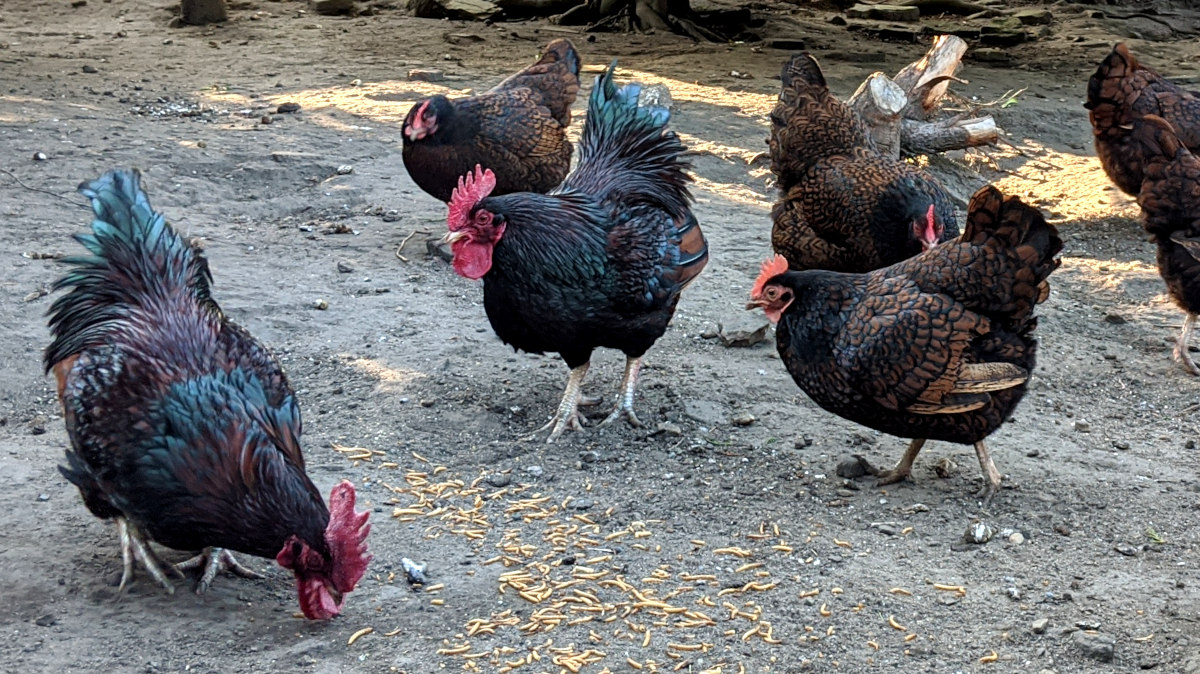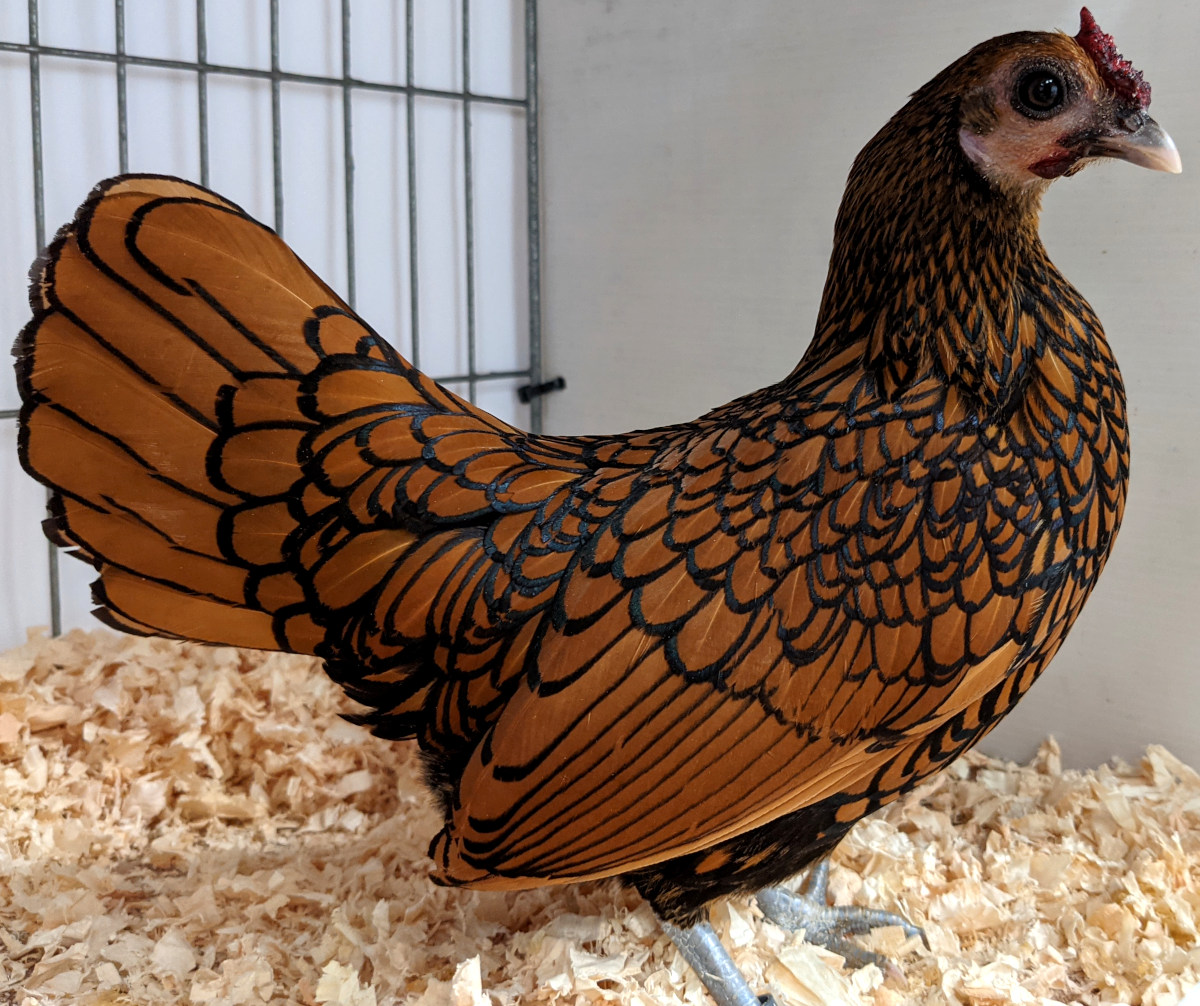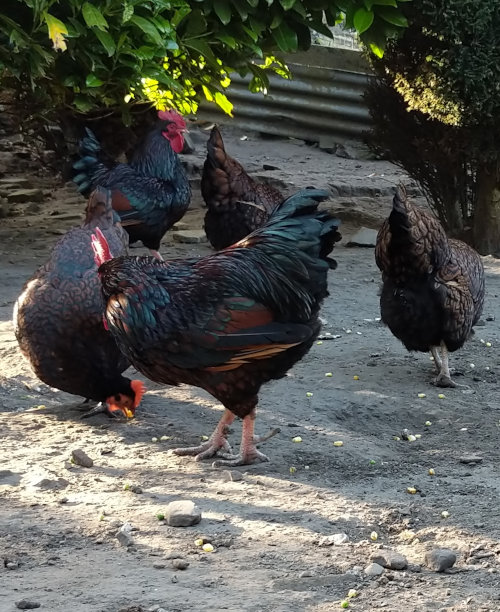Feeding bantam chickens.

Bantam chickens are small variants of regular chickens, with most features similar to standard-sized ones. This similarity includes the feeding habits, as well as the type of food that bantams can consume.
Table of Contents
However, given that standard chickens are kept for intensive meat or eggs production and bantams for their exotic appearance, there are a few differences in attending to their dietary needs.
Feeding bantams and chickens:
Bantam chickens have the same nutritional needs as regular-sized chickens.
It can seem sometimes like the rules for feeding are almost as numerous as the poultry feeders. Some people think only of the chickens and others think only of their own convenience.
Chickens need food that is specific to their diet, which includes:
- Layers pellets, or age appropriate feed like crumbles or growers.
- Whole grains and scratch. Mixed whole grains of different types are excellent feed for the backyard flock.
- Greens. Chickens love greenery and it is an essential source of calcium and other nutrients.
- Protein. Eggs are almost entirely protein and laying hens need around 16% in their diet.
- Grit is important for bantam chickens' digestion. You can give them grit in the form of small pebbles or oyster shells.
- Supplements.
As part of a regular diet, layers pellets and whole grains are some of the best sources of nutrition for bantams and other chickens and a sufficient supply of it should be available to the chickens all the time.
Bantams don't need as much of an extra boost for eggs or meat production, so a well-balanced diet is recommended for a healthy and active life.
How much will bantams eat?
I have seen it said that around 1/4 of a pound for an average large chicken and 1/3 for heavy ones, but what about bantams. Bantam chickens eat less food than regular-sized chickens. You will need to adjust the amount of food you give them accordingly. A good rule of thumb is to feed them 1/4 to 1/2 cup of feed per day.
My bantams eat between 2 and 3 ounces a day depending on the breed and the quality of the feed you use.
Some feeds are less energy dense than others.
Below: Small true bantams like this Sebright, eat very little in comparison.

I feed a mix of foods, layers pellets, whole grains, shell and grit and a few supplements. The birds have access to it all day.
Bantams will eat less than that, around half as much, but the food source should be available throughout the day. Chickens prefer to eat small portions but often.
What is the best feed for bantam chickens?
Chickens are omnivorous, which means they will consume food of both plant and animal origin.
The free-range chicken will eat most things in their surroundings, from whole seeds, greens, flowers, fruits, vegetables, insects, worms, small lizards, or even small rodents. In addition to the food they can find around them, chickens are no strangers to scraps of the cooked food that some owners offer them.
Below: Free range is best for all chickens, not just bantams.

It is important to know the difference between the food and the treats. Many breeders mix up these two types under the excuse, "my chicken love to eat that, so I give them plenty."
Same as you wouldn't feed a child only candy or chocolate, you shouldn't feed your bantams only fruits or scraps, even though they love it.
Primary food for Bantam chickens:
Primary food includes pellets mix or the whole seed mix. Pelleted feed is a complete meal for chickens containing cereal grains, vegetable and animal protein sources, and nutritional additives.
Depending on the brand, stage of life in which chickens are fed, and the expected final result (meat or egg production), there are many types of pellets with different ratios of all of those ingredients.
Some breeders make their own whole seeds mix, which they give to their chickens as the primary food. The downside of this mix is that it needs additional proteins and other nutritional supplements.
Below: Fresh vegetables are good for chickens.
This type of feeding is usually used with free ranged bantams, which can find the sources of proteins and minerals in the surroundings.
The whole seeds that are used in this mix are barley, corn, wheat, oats, and peas. Although, every experienced and successful breeder brags about their own recipe with the "secret" ingredient.
Proteins in the bantams diet:
Proteins are crucial in the healthy development of bantams from the moment they hatch till the rest of their lives.
In the first few weeks after hatching, young bantams need high protein food. The best option is starter pellets that are rich in all the necessary ingredients. Due to their fragile little bodies and sensitive digestive system, it is not recommended to experiment with homemade mixes.
As the chickens reach their full form, a breeder can adjust the food to fit their needs.
A few stages in the bantams' life cycle require a higher protein diet, which can be added as treats to the primary food. The moulting period where chicken needs extra energy to grow new feathers, harsh winter conditions where temperatures go under the freezing point, situations with a lot of stress such as relocation, and during the intensive egg-laying periods, which also can be stressful for hens.
It is important to remember that high protein foods are not meant to substitute for a bantams' feed but as an occasional treat.
Some foods rich in protein are Cooked eggs (the best are hard-boiled eggs), Sunflower seeds, Pumpkin seeds, Meal-worms, and Fish meal.
Minerals and non-organic supplements:
Minerals are essential for the functioning of body cells. Sodium, Potassium and other salts are critical for electrolyte balance in the body.
Calcium, magnesium, and phosphorous are used in bone formation. Copper, iodine, iron, zinc, and selenium are all useful for chemical reactions in the body and necessary for bantams' health.
Below: Supplementary feed for bantams.
Pellets are fortified with these non-organic components of the diet so there is no need to add it to the chicken's diet.
In fact, the breeder needs to be careful with treats when feeding pellets, as too many non-organic elements can be harmful or even poisonous to bantams.
When feeding chickens with the whole grain mix as primary food, supplementing the diet with non-organic elements is necessary. The chicken food market has various non-organic supplements, like bone meal, grit, meat meal, and other mixes.
Greens, forage and sprouts for bantams:
If there is one thing, bantams can't get enough, that's fresh greens. Even though this cannot be the primary and only food, green treats are healthy and good for overall health.
Below: Chickens eating their greens, in this case a whole head of broccoli.
Kale, Broccoli, Cucumbers, Turnip greens, Carrots tops, and Radish tops are full of valuable vitamins and minerals with great benefits. They also help to keep chickens amused when hung in the run.
However, some greens are not healthy for chicken consumption. Tomato leaves, potato leaves or raw potato, and rhubarb are toxic for chickens and should be avoided at all costs.
Caution is needed with fresh greens because of chemicals like pesticides and insecticides with which plants are often treated. Make sure that the plants are clean and organic before offering them to your bantams.
Scraps:
Bantams are not picky eaters, and people often mistake giving them anything edible. It's a bad tradition that chickens are treated as scavengers to clean up the scraps left from human meals.
Below: Bantams love scraps but too much is bad for them.
The truth is quite the opposite and if anything can be harmful to the bantams, it's too much scrap food. Often masked with different flavors, human food is full of salt, fat, spices, sugar, and other dangerous and fatal additives.
Bantams can and will eat most scraps, but it's up to humans to dose the amount and avoid harmful products. Chocolate and anything with too much sugar in it, coffee, citrus peels, mouldy or rotten food, food with too much salt in it, and anything that is processed or has unknown ingredients in it must be excluded in total.
See here for a complete list of all foods chickens can and can't eat.
The best advice is to avoid scraps in general, subsequently avoiding the risk of harming the birds.
Human food that has been supplemented with vitamins or minerals may turn out to be poisonous to chickens.
As mentioned above, the pellets chicken food has everything your chickens need to live a happy and healthy life. And with the addition of occasional treats and free-range, you will create a perfect little environment for all to enjoy.
